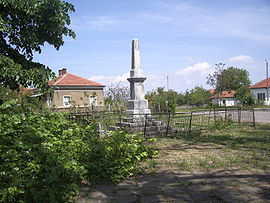- Mahala
-
For the village in Moldova, see Corjova, Dubăsari.
Mahala is a Balkan word for "neighbourhood" or "quarter", a section of a rural or urban settlement, dating to the times of the Ottoman Empire. It was brought to the area through Ottoman Turkish mahalle, but it originates in Arabic mähallä, from the root meaning "to settle", "to occupy". It is rendered as follows in the languages of the region: Bulgarian: махала, mahala; Bosnian and Serbian: махала/mahala or маала/maala; Romanian: mahala; Albanian: mahallë; Greek: μαχαλάς, machalas; Macedonian: маало, maalo or маала, maala; Romani: mahala; Aromanian: mãhãlã. A mahala was a relatively independent quarter of a larger village or a town, with its own school, religious building or buildings, mayor's representative, etc.[1] Mahalas are often named after the first settler or, when ethnically separate, according to the dominant ethnicity.
In Bulgaria, mahalas were administratively considered a separate type of settlement on some occasions; today, settlements are only divided into towns or villages, and the official division of towns is into quarters. In rural mountainous areas, villages were often scattered and consisted of relatively separate mahalas with badly developed infrastructure.
In Romanian, the word mahala has come to have the strictly negative or pejorative connotations of a slum or ghetto[2] that are not present or at least not as strongly implied in other languages.
See also
References
- ^ Чолева-Димитрова, Анна М. (2002) (in Bulgarian). Селищни имена от Югозападна България: Изследване. Речник. София: Пенсофт. pp. 20–21. ISBN 954-642-168-5. OCLC 57603720.
- ^ "Free Online English<>Romanian Dictionary — Dictionar Englez Roman". Industrial Soft. http://www.dictionare.com/dictionaries/dictionary.htm. Retrieved 2008-10-09.
Categories:- Urban studies and planning terminology
- Types of country subdivisions
- Arabic loanwords
- Balkan culture
- Culture of the Ottoman Empire
Wikimedia Foundation. 2010.

